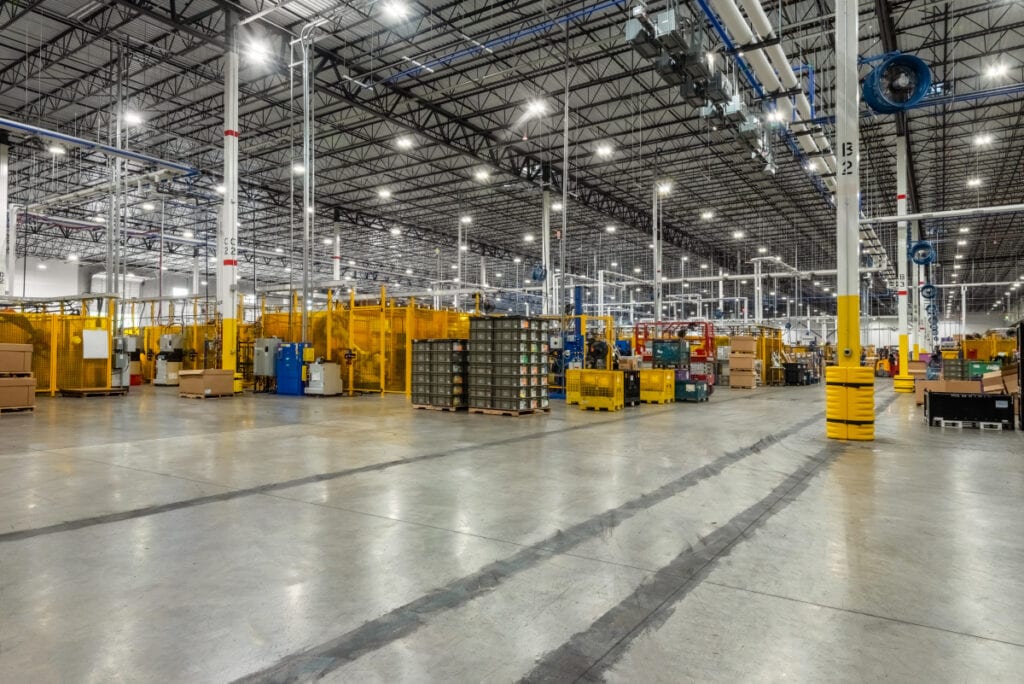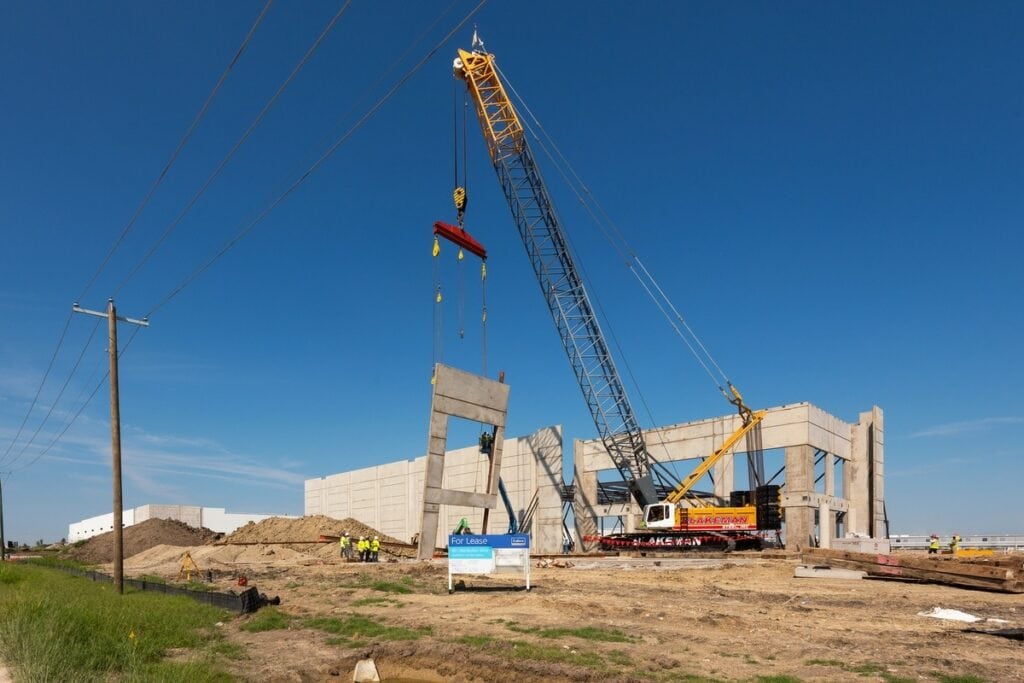When selecting a commercial general contractor, operational excellence is a key differentiator for developers and construction managers. It goes beyond being a buzzword; it is a strategic approach that ensures projects are delivered on time, within budget, and to the highest quality standards.
This article touches on the critical components that signify operational excellence in a general contractor. Key elements include robust communication and transparency and fostering a culture of collaboration and trust among all stakeholders. By recognizing and prioritizing these principles, developers and construction managers can identify contractors who are likely to deliver predictable results, enhancing the success of their projects and solidifying their reputation in the industry.

Key Takeaways
- Robust Communication: Regular updates and clear reporting build trust and align expectations, key for success.
- Collaboration: A collaborative environment among all parties leads to smoother execution.
- Cost Management: Look beyond the lowest bid; consider all components and realistic costs for transparent finances.
- Subcontractor Trust: Trust with reliable subcontractors is crucial for quality results.
- Subcontractor Insights: Ask subcontractors about their preferred contractors for smoother execution and higher quality results.
Importance of Communication and Transparency
Effective communication and transparency are foundational pillars for successful construction projects. When every stakeholder is aligned and informed, the chances of project success significantly increase. Developers, for example, are deeply invested in understanding the project timeline and budget status. They seek regular updates on how the job progresses compared to the initial schedule and financial plan. Without a collaborative platform and transparent budget reporting, developers often experience unease, unsure of the project’s exact status. This lack of clarity can jeopardize their trust in the contractor’s ability to manage the project effectively.
Problems arise when a contractor fails to provide a transparent and collaborative environment. In the construction industry, it’s imperative that contractors keep the lines of communication open with developers and other stakeholders. This includes providing frequent updates on project milestones and any deviations from the original plan. When contractors are hesitant to share budgetary details or project timelines, it fosters an environment of distrust. Developers may start questioning the accuracy of the information provided, leading to apprehension about the project’s future.
The benefits of maintaining clear and transparent communication go beyond just easing developer concerns. A transparent approach helps preemptively identify potential issues, allowing for timely interventions. It also builds a rapport among all parties involved, creating a more cohesive team environment. In contrast, a lack of transparency often results in confusion, misaligned expectations, and, ultimately, project delays. Therefore, cultivating an atmosphere where communication and transparency are prioritized can pave the way for smoother project execution and more predictable outcomes.
Building Trust Through Collaboration
When developers entrust contractors with their resources, timelines, and project goals, it is essential to uphold that trust through consistent, open, and transparent communication. The best projects are those where transparency and collaboration are core principles. All parties work towards a common goal in these projects, sharing information freely and regularly. This open exchange helps ensure everyone is on the same page, fostering a sense of mutual respect and partnership.
Conversely, withholding information or failing to provide timely updates can lead to significant challenges. When developers are in the dark about their project’s progress, it breeds uncertainty and doubt. Contractors who are not forthcoming with updated metrics and project statuses create an environment of tension and unease. This lack of transparency can lead to misunderstandings, erode trust, and ultimately result in conflicts that could have been easily avoided.
When contractors are transparent, it not only alleviates developer concerns but also positions them as reliable partners. By fostering a collaborative environment, contractors can ensure smoother project execution and a more positive overall experience for all stakeholders involved.

Building Credibility With Subcontractors
Just as trust is indispensable in relationships with developers, it is equally crucial when working with subcontractors, whom we call our trade partners. When you have trade partners who are dependable, open, and honest about their progress, it makes it far easier to relay accurate information to your clients. The reliability of our projects is, to a large extent, determined by the trade partners we engage with. Their commitment to transparency and consistent results is pivotal to project success.
Examining their previous performances is the key to an effective partnership with trade partners. Have they proven themselves to be reliable and consistent in past projects? If the answer is yes, these trade partners become invaluable assets to any construction team. Being able to predict and depend on their performance allows us, as general contractors, to maintain our own credibility and deliver on our promises to developers.
At the end of the day, a trusted trade partner helps us shine in the eyes of our clients. When trade partners are reliable and transparent, the flow of information from ground-level operations to the client becomes smooth and trustworthy. This not only alleviates potential misunderstandings but also bolsters the overall efficiency and reputation of the project. Therefore, investing in trustworthy trade partners is a strategic move that pays dividends in reliability, predictability, and overall project success.
Reputation in the Subcontractor Community
A contractor’s reputation within the subcontractor community can make or break a project in the construction industry. It’s not uncommon to hear about contractors with questionable reputations who find it challenging to find subcontractors who are willing to work with them. Subcontractors may begrudgingly work with them out of necessity, but this lack of enthusiasm often translates into subpar performance, resulting in project delays and increased costs. For companies like ours that don’t self-perform any of the work, our projects’ success heavily relies on our subcontractors’ performance and reliability. Therefore, having a stellar reputation among subcontractors is beneficial and essential.
Our philosophy is straightforward: if our trade partners aren’t successful, we won’t be either. This principle underscores the importance of trust and reliability in contractor-trade partner relationships. At this stage, everyone is aiming for profitability, not practice runs. As general contractors, one of our primary responsibilities is to find that delicate balance between ensuring trade partners remain profitable and delivering successful, high-quality projects to our clients. This balancing act requires continuous communication, transparency, and mutual respect.
Trustworthiness is a two-way street. We expect trade partners to be reliable and forthright, but they also need to trust us to be fair and honest. Earning and maintaining this mutual trust takes time and consistent effort but yields significant project efficiency and quality dividends. When trade partners trust us, it fosters a collaborative environment where everyone is committed to the project’s success. This synergy smooths the workflow and significantly enhances the overall reputation and reliability of the contractor and the trade partners involved.
Importance of Trade Partner Satisfaction
Trade partners are the backbone of any construction project, performing most of the work required to bring a vision to life. Their satisfaction directly impacts their productivity and the overall quality of the project. When trade partners enjoy their work environment and have a positive rapport with the general contractor, they are incentivized to work harder and encounter fewer issues. This harmonious relationship is a critical factor in ensuring project success.
From a practical standpoint, collaboration and trust between contractors and trade partners are indispensable. The best contractors understand that their role isn’t just to oversee the project but to foster a collaborative atmosphere where trade partners feel valued and trusted. This involves open lines of communication, consistent updates, and a genuine partnership mentality. When subcontractors trust their contractor, the workflow becomes smoother, and the likelihood of encountering substantial problems decreases. This trust and mutual respect pave the way for high-quality work and project efficiency.
Therefore, when selecting a contractor, it’s wise to consider the opinions of those who do the bulk of the work—the subcontractors. While developers and other general contractors can provide insights, the subcontractors offer the most hands-on perspective. They are the ones in the trenches, dealing with the day-to-day challenges of the project. If subcontractors speak highly of a contractor, expressing a desire to work with them again, that indicates the contractor’s capability and reliability. Prioritizing subcontractor satisfaction enhances project outcomes and builds a solid foundation for future collaborations.

Evaluating Bids and Cost Accuracy
When evaluating bids and ensuring cost accuracy in construction projects, the lowest number offered isn’t always the best choice. Opting for the lowest bid might appear cost-effective initially, but it often conceals potential risks and overlooked expenses. When we construct our estimates, we evaluate all the trade partner bids across our bid tabs to ensure they are comparable. This diligent process often leads us to dismiss some of the lowest bids simply because they seem unfeasibly low, raising red flags about the quality or completeness of the work proposed.
We’ve faced scenarios where our deliberate and open approach to estimating costs led us to lose out on projects. We’ve meticulously reviewed numbers, often advising developers, “I don’t think you can get this job built for the amount you’ve quoted.” More often than not, our caution proves justified. Our aim is to include all necessary components in our estimates to reflect the true cost of completing the project. This transcends mere paper evaluations because construction projects can’t be effectively managed by looking solely at the bottom-line figure; they require a comprehensive understanding of realistic costs.
Simply put, if you focus only on the lowest bid without considering the practical realities of what it will take to get the job done, you are setting yourself up for financial surprises. An accurate bid considers all variables, from materials and labor to potential delays and unforeseen challenges. In the end, a well-rounded and carefully analyzed bid helps deliver the project successfully and maintains trust and transparency with developers. Consistency in cost estimation is crucial for project success and ensures that timelines and budgets remain on track, ultimately leading to predictable and satisfactory outcomes for all stakeholders involved.
Team Collaboration and Problem Solving
It takes a synchronized team—the design team, the developer, the contractor, and subcontractors—to bring a project to fruition. The contractor’s role is pivotal, acting as the glue that binds all these different players together, ensuring everyone is striving toward the same goal. Far from a game of pointing fingers, the essence of effective project execution lies in collective responsibility. It’s not about blaming the architect for flawed designs, the subcontractor for underperformance, or the developer for delays. Instead, it’s about tackling the project head-on with a united front.
A collaborative mindset sets the stage for any construction project to succeed. When you adopt this ‘we’re all in this together’ attitude, everyone takes ownership of their role while remaining aligned with the broader objectives of the project. The contractor’s task is to foster this team spirit, ensuring that every stakeholder feels valued and accountable. By treating everyone as integral team members, contractors can steer the project smoothly through to completion, even when challenges arise.
Realistically, problems will occur—it’s an inevitable part of managing large-scale projects. However, the hallmark of a successful team is how it navigates these issues. The focus should shift from assigning blame to finding actionable solutions. Whether it’s a design flaw or an unanticipated delay, the key lies in rapid, transparent communication and a problem-solving attitude. The ultimate goal is to keep the project moving forward, leveraging each team member’s strengths to overcome any obstacles that come your way.
The Path Forward: A Commitment to Excellence
In conclusion, achieving operational excellence in the construction industry is not merely about hitting project milestones; it’s about setting a gold standard for reliability, transparency, and collaborative success. By prioritizing effective communication, rigorous cost accuracy, and fostering strong, trust-based relationships with trade partners, we ensure that every project is executed with the utmost precision and predictability. Our unwavering commitment to these principles solidifies our reputation as a trusted partner in delivering high-quality, timely, and on-budget construction projects.
As you consider your next project, remember that selecting a partner who exemplifies operational excellence can differentiate between success and unforeseen challenges. We invite developers, corporate clients, healthcare providers, and potential partners to reach out and discover how our expertise can bring your visions to life with confidence and reliability. Trust us to be the cornerstone of your next construction venture, and let’s build something exceptional together.

About Gordon Highlander
Gordon Highlander, headquartered in Texas, is a premier commercial general contractor focusing on design-build and partially- and fully-engineered construction solutions. With decades of legacy, we have delivered millions of square feet across diverse commercial and industrial sectors. Our expertise extends to major Texan markets, including Dallas-Fort Worth, Austin, San Antonio, Houston, and Atlanta, Georgia.

